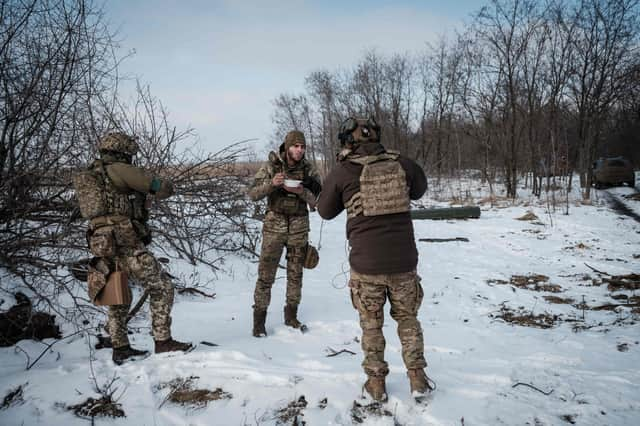Ian Ellis: Church prayers for peace in Ukraine always need to go alongside humanitarian action


To add to that, a new Russian offensive is widely expected later this month as February 24 brings the one year mark since President Putin ordered his troops into Ukraine.
As in any conflict, the question in most minds is just when, and how, it will come to an end.
Advertisement
Hide AdAdvertisement
Hide AdIn an address to the recent meeting of the World Economic Forum in Davos, Switzerland, on the theme of 'Restoring Security and Peace', Ukraine's President Volodymyr Zelenskyy drew attention in particular to the ferocity of the conflict in the east of his country at the time.
Referring to the national spirit, he added: “We are mobilized because we are motivated, because we are defending what is ours."
Mr Zelenskyy also referred to the multiple challenges facing his country, from Russia's disruption of energy with missiles and Iranian drones to the need for more armaments, including air defence systems.
The Ukrainian president further made reference to his ten-point peace plan, which he had set out to the G20 meeting in Bali last November, a meeting which President Putin did not attend in person, having bowed out shortly before the event started.
Advertisement
Hide AdAdvertisement
Hide AdRussian foreign minister, Sergey Lavrov, attended in his place.
Peace is of course what the churches always pray for, and with prayer must always go action. Indeed, Irish churches have been responding in their own ways out of humanitarian concern.
The Brussels-based Conference of European Churches (CEC), of which the Church of Ireland and the Methodist and Presbyterian Churches in Ireland are full members, has now drawn up its own project, entitled, 'Pathways to Peace'.
This initiative aims to offer a platform for exchange and cooperation among CEC member churches, focusing on advocacy on a European political level and highlighting human rights issues.
Advertisement
Hide AdAdvertisement
Hide AdIt also aims to strengthen the participation of European youth in the process.
The CEC general secretary, Danish churchman Dr Jørgen Skov Sørensen, told me for this column: “CEC has developed the Pathways to Peace initiative as a coordinated European response to the war in Ukraine. Many of our member churches are already active 'on the ground' working with refugees and relief operations inside Ukraine.”
He said that, at its heart, CEC is a “bridge building organisation”, adding that it had listened to the needs expressed by church representatives in Ukraine, and beyond, and had tailor made its objectives accordingly.
At a January 27th meeting at the EU Commission in Brussels, CEC president Rev Christian Krieger expressed his appreciation of the strong commitment and EU’s clear position in handling the situation created by the invasion of Ukraine, in particular regarding economic and military solidarity, the status for refugees, and sanctions.
Advertisement
Hide AdAdvertisement
Hide AdAs for President Zelenskyy's own peace plan, it is both comprehensive and clear, focusing on
• Ensuring radiation and nuclear safety;
• Protecting global food security affected by the war;
• Establishing energy security for Ukraine and other countries;
• The release of all prisoners and deportees;
• The implementation of the UN Charter and restoration of Ukraine’s territorial integrity and the world order;
• The withdrawal of Russian troops and cessation of hostilities;
Advertisement
Hide AdAdvertisement
Hide Ad• Justice in respect of Russia's aggression, including Russian compensation;
• Preventing ecocide and meeting the need for immediate protection of the environment;
• The prevention of conflict escalation; and
• Confirmation of the end of the war
Whatever precise course the war will take as winter eventually gives way to spring, the non-partisan United States Institute for Peace (USIP), which says it is “dedicated to the proposition that a world without violent conflict is possible, practical and essential”, has observed that there is one certainty, namely, that “Ukrainian soldiers and civilians will continue to fight Russia’s assault with every weapon at hand — or with none”.
On January 11, USIP said that Ukrainians have clearly shown to the world that they will not simply surrender.
Advertisement
Hide AdAdvertisement
Hide AdPointing to the “consistency” of public opinion in Ukraine, USIP stated: “In the latest of regular surveys by the Kyiv International Institute of Sociology, 85 percent of Ukrainians rejected any surrender to Russia of sections of Ukraine that it has seized”, even if as a result the war would last longer.
Furthermore, with concerted Western support Ukraine is far from on its own in its single-mindedness.
Addressing the issue of EU accession for Ukraine in a speech on February 2 in Kyiv, Commission president Ursula von der Leyen noted that Ukraine had become a candidate country “while fighting an invasion”, adding that it was making “impressive progress” in the process.
Considering the current options for peace, USIP has pointed out that the search for a peaceful resolution has to avoid three things at least:
Advertisement
Hide AdAdvertisement
Hide Adrewarding the aggressor; giving Russia time to rebuild its capacities; and betraying the Ukrainians' desire to secure their sovereignty, territorial integrity and future security.
The churches' role in the current context includes continuing to pray for a peaceful and just outcome, coordinating their humanitarian and advocacy initiatives, as the Conference of European Churches is aiming to do, and encouraging people everywhere to make the things that make for peace a constant priority.
• Canon Ian Ellis is a former editor of The Church of Ireland Gazette